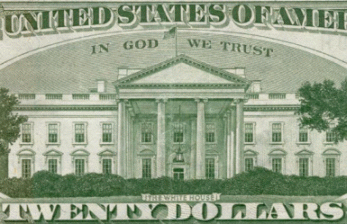
The story of the
United States: An ongoing wrestling match
between material
well-being and a deeply-held spirituality.
Diario Economic, Portugal
Understanding
American Voters: 'In God We Trust'
"To the eyes of an
increasingly secular Europe, the importance that the phenomenon of religion has
on the lives of Americans never fails to appear strange."
By Nuno Sampaio

Translated By Brandi Miller
April 23, 2008
Portugal
- Diario Economico - Original Article (Portuguese)
In a year of presidential
elections and with the delicate question of the pedophilia scandals, Pope
Benedict XVI's visit to the United States of North America made, as it couldn't
fail to do, tremendous repercussions in the media - and rightly so. Curiously,
to the eyes of an increasingly secular Europe, the importance that the phenomenon
of religion has on the lives of Americans never fails to appear strange.
While a strong presence of
religiosity is a distinctive feature of American society, the separation of
church and state, since the founding of the United States of America, has been
a pillar of progress for democratic institutions as well as an affirmation of
religious belief. It was this separation that allowed for the full expression
of both, and which, although it may seem paradoxical, was a catalyst for both.
As such, it continues to inspire curiosity that the inscription that is
understood to be a symbol of material well-being so dear to Americans on the
one dollar note reads: "In God We Trust."
Posted by WORLDMEETS.US

In the nineteenth century,
Alexis de Tocqueville  understood and described as few ever have, the
religious dimension in America: "In the United States, on the seventh day
of every week, the trading and working life of the nation seems suspended; all
noises cease; a deep tranquility, say rather the solemn calm of meditation,
succeeds the turmoil of the week, and the soul resumes possession and
contemplation of itself," he writes in Democracy in America.
understood and described as few ever have, the
religious dimension in America: "In the United States, on the seventh day
of every week, the trading and working life of the nation seems suspended; all
noises cease; a deep tranquility, say rather the solemn calm of meditation,
succeeds the turmoil of the week, and the soul resumes possession and
contemplation of itself," he writes in Democracy in America.
|

|
|
Alexis de Tocqueville, the 19th century French writer
that managed to capture a portrait of the U.S. still seen as the seminal
work on what makes America tick.
|
|
|
For Tocqueville, religion
works the same way for institutions - as a balancing factor for the democratic
individual and his concern for the pursuit of material well-being, as one reads
a bit later: "The Americans show, by their practice, that they feel the
high necessity of imparting morality to democratic communities by means of
religion." Thus this dualism of material well-being and spirituality, with
all of its tensions and affinities, are concretized symbolically - on America's
paper currency.
But the story doesn't end there.
In recent presidential elections such as the one between George W. Bush and
John Kerry, several studies of electoral behavior showed that the principal
dividing factor among American voters was religion. The complex financial
situation that the sub-prime crisis has brought about has allowed economic
issues to gain some added importance in the political debate. But the religious
factor will continue to strongly influence U.S. electoral behavior. Regardless
of how far the dollar falls, it will continue to read: "In God We
Trust."
CLICK HERE FOR
PORTUGUESE VERSION
[Posted by WORLDMEETS.US April 24, 7:19pm]